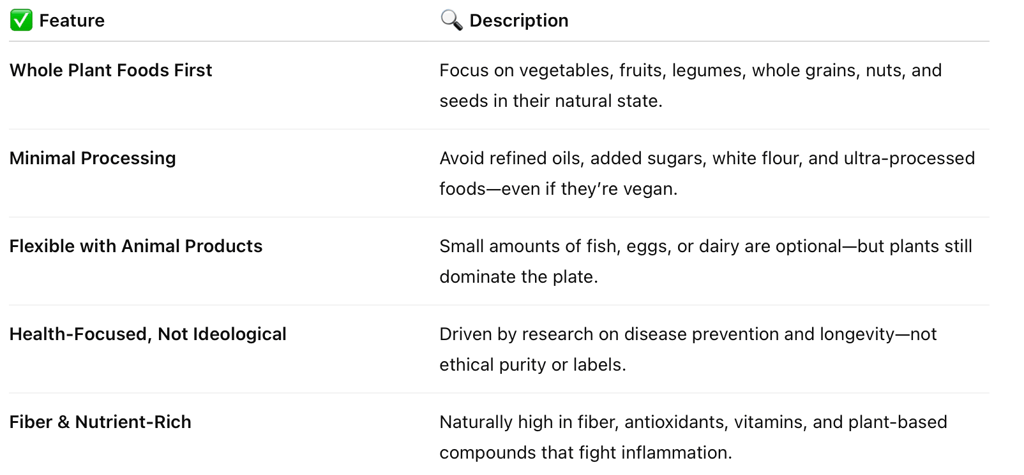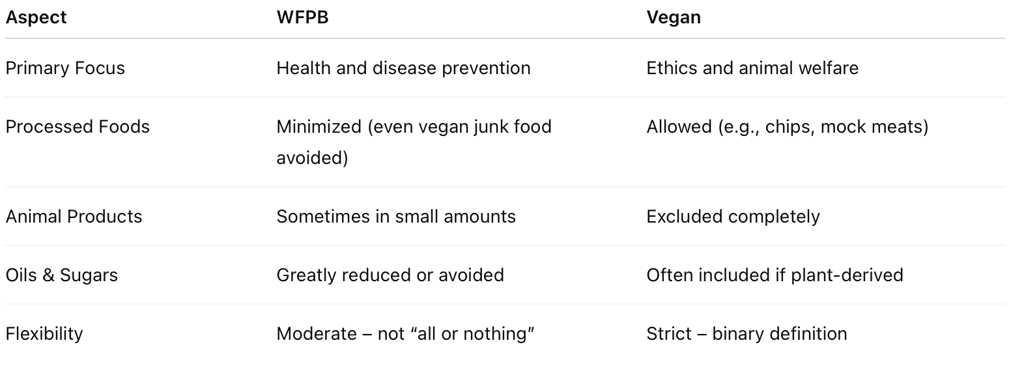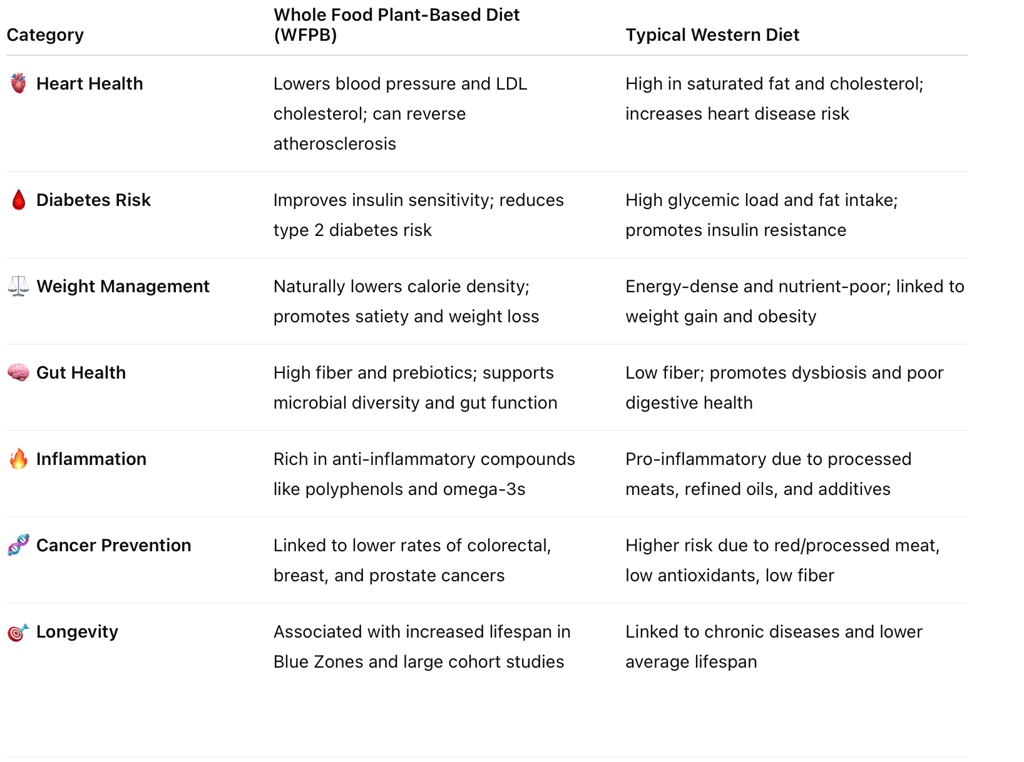

Whole Food Plant-Based Diet
A Science-Backed Path to Better Health
A Simpler Way to Eat for Energy, Longevity, and Disease Prevention
Nutrition doesn’t have to be extreme to be effective. Somewhere between hyper-processed vegan snacks and steak-heavy keto plans lies a powerful, research-backed approach: the whole food plant-based diet (WFPB). Unlike strict veganism, WFPB is less about moral rigidity and more about prioritizing nutrient-rich, unprocessed plant foods that have been proven to improve health outcomes—especially when it comes to heart disease, type 2 diabetes, and inflammation.
People often associate healthy eating with restriction, bland meals, or the stress of perfection. But WFPB offers a flexible, forgiving alternative rooted in evidence-based wellness. Whether you're looking to reverse chronic illness, lose weight without counting calories, or just feel more energized, WFPB is a smart, sustainable option that’s gaining traction in both medical circles and home kitchens.
This article explores what the whole food plant-based diet really is, why it works, what the science says, and how to make it part of your lifestyle without the overwhelm.
What Is a Whole Food Plant-Based Diet?
Not Just Another Diet Trend
The whole food plant-based diet (WFPB) isn’t a fad—it’s a long-term, evidence-based approach to eating that centers on maximizing health through unprocessed or minimally processed plant foods. Rather than being a strict set of rules, it’s a framework that encourages people to fill their plates with nutrient-rich plants while gradually reducing or eliminating foods that contribute little to overall health.
At its core, the WFPB diet is built around whole vegetables, fruits, legumes (like beans, lentils, and chickpeas), whole grains (such as oats, brown rice, and quinoa), nuts, seeds, and fresh herbs and spices. The idea is to eat these foods in their most natural, least altered form, preserving their fiber, vitamins, minerals, and bioactive compounds.
Unlike veganism—which strictly excludes all animal products for ethical or environmental reasons—the WFPB lifestyle is more flexible. While many WFPB eaters choose to eliminate animal products entirely, the diet allows for occasional or minimal use of foods like eggs, yogurt, or fish, depending on personal preferences and health goals. The emphasis remains on what you include, not just what you exclude.
It also sets itself apart from “plant-based” processed diets, which can still include refined grains, oils, and high-sugar snacks marketed as healthy just because they're meat-free. A WFPB eater might skip the vegan cheese pizza or soy hot dogs in favor of a hearty lentil stew, colorful roasted vegetables, and a handful of walnuts.
Key Features of a Whole Food Plant-Based Diet (WFPB)


Whole Food Plant-Based vs. Vegan: What's the Difference?


Health Benefits of a Whole Food Plant-Based Diet
One of the most compelling reasons to adopt a whole food plant-based diet is the overwhelming evidence of its role in preventing, managing, and even reversing chronic diseases. From cardiovascular health to long-term weight management, the benefits go far beyond nutrition—they reflect a profound shift in how food interacts with the body at every level.
1. Heart Health and Cholesterol Control
Cardiovascular disease is the leading cause of death worldwide—but it’s also one of the most preventable and reversibleconditions when diet is addressed properly. Clinical trials led by pioneers like Dr. Dean Ornish and Dr. Caldwell Esselstyn have shown that a WFPB diet can halt and even reverse atherosclerosis, the buildup of plaque in the arteries that leads to heart attacks and strokes.
Here’s how:
Saturated fat and cholesterol from animal products are dramatically reduced
Plant-based foods are naturally high in soluble fiber, which helps lower LDL ("bad") cholesterol
Nitric oxide–producing compounds in leafy greens help improve endothelial function, enhancing blood flow
In a landmark study, Dr. Esselstyn reported no further cardiac events in patients with severe coronary artery disease after they adopted a strict WFPB diet—despite having previously suffered angina, heart attacks, or bypass surgeries.
2. Type 2 Diabetes Management
Insulin resistance, the hallmark of type 2 diabetes, is strongly influenced by dietary fat and low fiber intake. A WFPB diet tackles both by:
Significantly increasing dietary fiber, which slows glucose absorption
Reducing intramyocellular fat (fat inside muscle cells), which helps restore insulin sensitivity
Lowering post-meal blood sugar spikes due to low glycemic load
Data from the Adventist Health Studies—which followed over 96,000 participants—found that individuals following a plant-based diet had half the risk of developing type 2 diabetes compared to non-vegetarians. Even modest reductions in animal product consumption correlated with better metabolic markers.
In practice, many people who switch to a WFPB approach report lower A1C levels, less need for medication, and even remission of diabetes symptoms under medical supervision.
3. Weight Loss Without Calorie Counting
One of the most empowering aspects of WFPB is that you don’t have to count calories to lose weight. The diet is naturally low in calorie density (fewer calories per bite), which means people feel full before they consume too many calories.
Why it works:
Whole plant foods contain water, fiber, and bulk—all of which stretch the stomach and trigger satiety hormones
Fatty, processed foods are replaced with nutrient-dense but low-calorie options
Protein from beans and legumes provides long-lasting fullness
In multiple studies, participants following a WFPB plan lost more weight over 12–24 weeks than those following calorie-restricted omnivorous or even Mediterranean diets—even when eating freely. It’s a sustainable, non-restrictive approach to weight loss that supports long-term success without willpower fatigue.
4. Gut Health and Inflammation
Your gut isn’t just a digestive tract—it’s a powerful immune and neurochemical hub, and it thrives on fiber. WFPB diets are among the richest in both soluble and insoluble fiber, which:
Feed beneficial gut bacteria (prebiotic effect)
Promote microbial diversity, linked to better immunity and mood
Produce short-chain fatty acids (SCFAs) like butyrate, which reduce inflammation and support colon health
Moreover, plant foods are rich in polyphenols, antioxidants, and resistant starches, all of which act as anti-inflammatory agents at the cellular level. Chronic inflammation is a driver of conditions like arthritis, metabolic syndrome, and even depression—and a WFPB diet tackles it at the root.
A diverse gut microbiome also means better hormone regulation, cognitive function, and resistance to illness—all built on the fiber found only in plants.
5. Longevity and Cancer Protection
Regions known as Blue Zones—including Okinawa (Japan), Sardinia (Italy), and Nicoya (Costa Rica)—consistently show that the longest-lived people on Earth eat mostly plant-based diets. Legumes, whole grains, green leafy vegetables, and nuts are central to their meals, with little to no processed food.
Epidemiological studies back this up:
Higher intakes of fruits, vegetables, and fiber are associated with lower rates of colorectal, breast, and prostate cancers
Cruciferous vegetables (e.g., broccoli, kale) contain sulforaphane, a compound with proven anti-cancer activity
Phytochemicals like flavonoids, carotenoids, and lignans found in plants can inhibit tumor growth and support DNA repair
In addition, plant-based diets help maintain lower levels of IGF-1 (insulin-like growth factor), which in excess has been linked to cancer progression.
While no diet guarantees immunity from cancer, WFPB provides a protective nutritional environment that enhances the body's ability to defend against cellular damage and disease development.
Whole Food Plant-Based vs. Western Diet – Health Outcomes


Scientific Support for a Whole Food Plant-Based Diet
The health benefits of a WFPB lifestyle aren’t based on trend or anecdote—they're grounded in decades of robust, peer-reviewed research. Multiple large-scale studies and clinical trials have shown that a diet built around unprocessed plant foods can prevent, halt, and even reverse some of the most common chronic diseases of our time. Below are three of the most influential studies that have shaped the plant-based movement.
The Ornish Lifestyle Heart Trial (1990s)
Lead Researcher: Dr. Dean Ornish
Published in: The Lancet (1990)
This landmark clinical trial was the first to demonstrate the reversal of coronary artery disease without surgery or medication. Dr. Ornish’s program involved several lifestyle changes—including stress reduction, moderate exercise, social support, and a primarily whole food plant-based diet (less than 10% fat).
Key Findings:
Participants showed improved blood flow to the heart after just 1 year
Reduction in arterial plaque measured via angiography
Chest pain (angina) symptoms decreased or disappeared entirely
After 5 years, patients in the WFPB group maintained or improved outcomes, while the control group worsened
Why It Matters:
This trial revolutionized how medicine viewed heart disease—not as an inevitable, progressive condition, but as one that can improve through nutrition and lifestyle alone.
The China Study (2005)
Authors: Dr. T. Colin Campbell & Dr. Thomas M. Campbell
Published by: Cornell University, Oxford University, Chinese Academy of Preventive Medicine
Dubbed “the most comprehensive study of nutrition ever conducted,” the China Study analyzed the diets and disease patterns of 6,500 adults across 65 rural Chinese counties, where diet varied widely by region. Researchers found strong associations between high animal-product consumption and increased rates of heart disease, diabetes, and cancer, whereas regions with plant-based diets had drastically lower disease incidence.
Key Takeaways:
Higher intake of animal protein was linked to higher blood cholesterol and cancer rates
Diets rich in whole grains, vegetables, and legumes were associated with lower chronic disease risk
The more plant-based the diet, the stronger the health outcomes
Why It Matters:
This large-scale epidemiological study gave compelling cross-cultural evidence that a WFPB diet isn't just effective in clinical settings—it’s protective at the population level.
The PREDIMED Study (2013)
Full Name: Prevención con Dieta Mediterránea
Published in: New England Journal of Medicine
While not exclusively plant-based, the PREDIMED trial followed more than 7,400 individuals at high cardiovascular risk and tested the impact of different versions of the Mediterranean diet, with an emphasis on whole plant foods like legumes, vegetables, fruits, nuts, and olive oil, alongside limited fish and dairy.
Key Results:
Participants following a whole food–rich Mediterranean diet had a 30% lower risk of major cardiovascular events compared to the control group
Benefits were strongest when participants consumed unprocessed plant foods and healthy fats from nuts and seeds
Showed improved glucose regulation, blood pressure, and inflammation markers
Why It Matters:
Although not fully WFPB, this trial confirmed that unrefined plant-based foods offer powerful cardiovascular protection, even in populations with elevated disease risk.
Bonus: Other Supporting Research
Adventist Health Studies (California): Found that vegetarians—especially those consuming mostly whole plant foods—had lower risks of heart disease, diabetes, hypertension, and obesity than meat-eaters in the same population.
Broad Study (New Zealand): Participants on a whole food plant-based diet lost significant weight and reduced their medication use, with no calorie counting or exercise changes required.
What Can You Eat on a WFPB Diet?
Foods to Embrace
Vegetables: Leafy greens, cruciferous veggies, root vegetables
Fruits: Berries, apples, bananas, citrus, stone fruits
Legumes: Lentils, beans, chickpeas, soy products like tempeh and tofu
Whole Grains: Brown rice, quinoa, oats, whole wheat, barley
Nuts & Seeds: Almonds, flaxseeds, chia, walnuts
Herbs & Spices: Basil, turmeric, garlic, rosemary, cinnamon
Foods to Limit or Avoid
Processed oils (e.g., vegetable oil, margarine)
Refined grains (e.g., white bread, pasta)
Added sugars and artificial sweeteners
Animal products (optional to avoid or reduce)
Ultra-processed vegan snacks (e.g., vegan cookies, soy-based hot dogs)
How to Start a Whole Food Plant-Based Diet
1. Start with Familiar Foods
Try plant-based swaps in dishes you already love:
Swap ground beef for lentils in chili
Replace white rice with brown or quinoa
Use banana or flaxseed as a binder instead of eggs in baking
2. Build Balanced WFPB Meals
Use the “Plant Plate” model:
½ plate veggies
¼ plate legumes
¼ plate whole grains
Add a small handful of nuts/seeds for healthy fats
3. Batch Cook for Simplicity
Pre-cook grains, legumes, and chop vegetables to save time. Make large pots of soups, stews, or curries to use throughout the week.
4. Read Labels
Even plant-based products can be filled with additives, refined oils, and sugar. Focus on ingredient lists with real, whole-food components.
Common Myths About WFPB
“You won’t get enough protein.”
False. Legumes, whole grains, tofu, tempeh, nuts, and seeds offer more than enough protein, especially when eaten in varied combinations.
“It’s too expensive.”
Not true. Staples like rice, beans, and oats are some of the cheapest foods per calorie. Buying in bulk and seasonal produce helps cut costs.
“It’s too restrictive.”
WFPB isn’t about restriction—it’s about prioritizing foods that heal. Occasional indulgences or flexibility don’t ruin the health benefits.
Supplements to Consider on a WFPB Diet
While WFPB offers nearly everything your body needs, these are smart additions:
Vitamin B12 (must supplement)
Vitamin D (depending on sun exposure)
Omega-3 (EPA/DHA) from algae-based sources
Iodine (via seaweed or supplement if not using iodized salt)
Final Thoughts: A Lifestyle, Not a Trend
The whole food plant-based diet is more than a temporary fix. It’s a sustainable way of eating that aligns with health, longevity, and even environmental goals. It doesn't demand perfection, just a commitment to prioritizing the types of foods that support your body best.
Whether you’re dipping your toes in or going all in, WFPB can be tailored to your pace. Your health doesn’t need a revolution—it needs consistency with the right foods.
References
The China Study (2005)
Book Title: The China Study: The Most Comprehensive Study of Nutrition Ever Conducted and the Startling Implications for Diet, Weight Loss, and Long-Term Health
Authors: T. Colin Campbell, PhD, and Thomas M. Campbell II, MD
Publisher: BenBella Books, 2005
Official Website: https://nutritionstudies.org/the-china-study
Summary:
The China Study is based on a 20-year collaboration between Cornell University, Oxford University, and the Chinese Academy of Preventive Medicine. It examined dietary patterns and disease incidence across 65 rural Chinese counties, revealing that diets high in animal products were linked to increased rates of chronic illness, while those rich in whole plant foods were associated with lower disease prevalence.
EPIC-Oxford Study (2019)
Study Title: Risks of ischaemic heart disease and stroke in meat eaters, fish eaters, and vegetarians over 18 years of follow-up: results from the prospective EPIC-Oxford study
Authors: Tong TYN, Appleby PN, Bradbury KE, et al.
Published in: BMJ, 2019;366:l4897
DOI: 10.1136/bmj.l4897
PubMed: PMID: 31484644
Summary:
This large-scale prospective study of over 65,000 UK participants found that vegetarians had a 22% lower risk of ischemic heart disease than meat eaters. However, vegetarians showed a slightly higher risk of hemorrhagic stroke. The results underline both the benefits and considerations of long-term plant-based eating patterns.
Marshall Islands WFPB Diabetes Trial (2024)
Study Title: A whole-food, plant-based intensive lifestyle intervention improves glycaemic control and reduces medications in individuals with type 2 diabetes: a randomised controlled trial
Authors: Hanick CJ, Peterson CM, Davis BC, et al.
Published in: Diabetologia, 2024
DOI: 10.1007/s00125-024-06272-8
PubMed: PMID: 39305340
Summary:
This randomized controlled trial in the Marshall Islands showed that a WFPB diet significantly improved blood sugar control, reduced the need for diabetes and cardiovascular medications, and even led to remission in some participants. It demonstrates the potential of WFPB for reversing type 2 diabetes through lifestyle change.
16-Week Low-Fat Vegan Diet Trial (2018)
Study Title: A plant-based diet in overweight individuals in a 16-week randomized clinical trial: metabolic benefits of a plant-based diet
Authors: Kahleova H, Petersen KF, Shulman GI, et al.
Published in: Nutrition & Diabetes, 2018;8(1):58
DOI: 10.1038/s41387-018-0067-4
PubMed: PMID: 30405108
Summary:
In this 16-week RCT, overweight participants following a low-fat vegan diet experienced significant reductions in body weight, body fat percentage, and insulin resistance. The study confirms the short-term metabolic benefits of a whole food plant-based dietary approach without calorie restriction.
WFPB Intervention in Metastatic Breast Cancer (2024)
Study Title: A whole-food, plant-based randomized controlled trial in metastatic breast cancer: weight, cardiometabolic, and hormonal outcomes
Authors: Campbell EK, Campbell TM, Culakova E, et al.
Published in: Breast Cancer Research and Treatment, 2024;206(2):273–283
DOI: 10.1007/s10549-024-07284-z
PubMed: PMID: 38446316
Summary:
This RCT demonstrated that women with metastatic breast cancer who followed a WFPB diet saw significant improvements in body weight, metabolic health, and hormone balance. The study suggests that plant-based nutrition may provide beneficial support during cancer treatment.
The BROAD Study (New Zealand, 2017)
Study Title: The BROAD study: A randomised controlled trial using a whole food plant-based diet in the community for obesity, ischaemic heart disease or diabetes
Authors: Wright N, Wilson L, Smith M, et al.
Published in: Nutrition & Diabetes, 2017;7(3):e256
DOI: 10.1038/nutd.2017.3
PubMed: PMID: 28319109
Summary:
This New Zealand-based RCT showed that participants following a WFPB diet experienced substantial weight loss and improved cholesterol and blood pressure—without needing to count calories or increase physical activity. Results were sustained for at least 12 months, highlighting the long-term feasibility of the diet.
